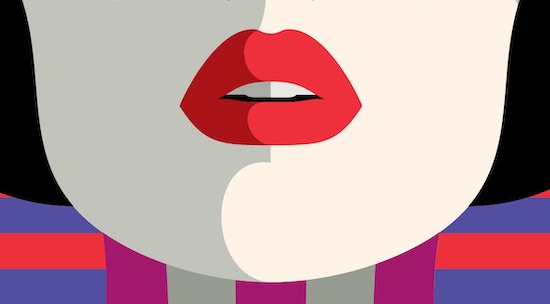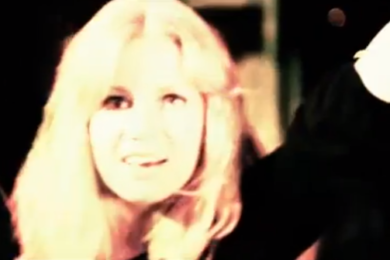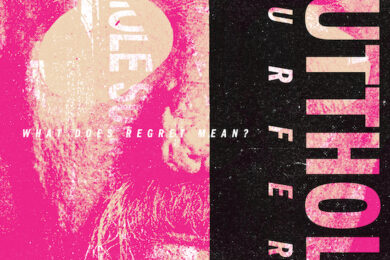One could write the story of American contemporary music based largely on a history of “oohs”: their nature and variety, their context and delivery. In particular, funk and R&B are founded on the power and seductiveness of non-verbal sounds. Lyric quotes can’t contain the shape-shifting nature of this music, in which every yelp or bark alters a song’s feel. Pop is a medium for immediacy rather than erudition, and “ooh” tends to be the moment where a song crystallizes its emotional affect. On TLC’s debut album Oooooohhh… On the TLC Tip (1992), the female R&B group issue the title cry in a hundred different ways: as a nuanced utterance full of longing, as the parody of a clucking boyfriend, and as a way to mock girlish helplessness.
“Ooh” is the sound that propels Quiet Storm, the highly influential genre of smooth late-night soul pioneered by African American artists since the 70s. At first glance, the lyrics of these songs may seem pedestrian, but just listen to the dynamics of the music. Regina Belle’s classic ‘Baby Come to Me’ (1989) contains the familiar imagery of heart-piercing and spine-tingling love, and the track starts off in a routine manner, with Belle declaring her passion in clear, beautiful tones. But there comes a point in the chorus where her voice becomes fudged and thickened with desire; her speech grows slurred as she mutters something about “got it goin’ on, you’re turnin’ me on.” There is a strong sense of eros in the way that the singer uses her lips to smear and muddy the lyrics. The song comes alive during these “oh” moments, when inarticulate longing distorts the mouth and confuses the words; Belle is able to narrow and expand the timbre of her voice, like a ribbon that twists and unfurls.
A great, self-reflexive track on the significance of “oh” is ‘Motownphilly’ (1991), the debut single of critically scorned quartet Boyz II Men. For this groundbreaking work alone, the band atones for their subsequent ballads and earns their place in pop heaven. The song lyrically references the evolution of music, from 60s Motown to 70s Philly soul to hip-hop. As they describe their history, they perform it orally, quoting the “daa-da, daa-da” of their school years in South Street. Since the story must be related in musical terms, a rap interlude gives way to the guys singing a clip from their first audition: a further series of “daa-das,” this time ending in a long, sensual groan: “Oh-oh-ohhh.” With that last sound, the band doesn’t need to say anything more about their origins: that “ohhh” is the deep cathartic sigh of Philadelphia soul. Subtle variations on “oh” and “daa- da” mark the changes in music as it takes a geographically specific route around the country.
There is the convincing belief that the inflection of a note can tell you everything you need to know about a region. These are localized sounds that impart specific moods to music: “oh” is the unit in a system of values that is sonically rather than lyrically based. Through their cries, the singers choose to flaunt their harmony and smoothness rather than their virility, and that keys us into their aspirations and backgrounds. In bringing several schools of sound together, Boyz II Men present themselves as a long-awaited fusion of genres and voices, culminating in the sound of “oh.” ‘Motownphilly’ is in itself a document of the times; tracking the boys on their journey to a global audience, with each bridge taking us back musically to their hometown of Philadelphia.
Ecstatic moments like these are more likely to be found in hip-hop, R&B, and commercial pop than in guitar rock or any of the more respectable genres, since the author who holds forth from his or her instrument tends to do so from the perspective of a single mind rather than an odd convergence of voices and sounds. I propose that some of the most stimulating work of the last thirty years has been created by maximalist, mercurial artists such as Janet Jackson, TLC, and the maverick rapper Neneh Cherry — three of the artists prominently featured in this book. Instead of warm organic tones and conventional refinement, what these acts offer are disturbing noises and synthetic textures, which are simultaneously addictive and puzzling. Identifying the ways and means of this music involves getting past the conventions of language as we know it: for instance, exploring how a word becomes weirdly de-emphasized when matched with a certain beat.
Most of all, it means moving beyond the masterly tradition of songwriting to revel in the greatest sounds ever released: the exact propulsion and energy of Janet Jackson’s “ooh-ooh-ooh, yeah,” the vibrating “whoa, whoa” of Chaka Khan, and the enchanted “ella” of Rihanna’s ‘Umbrella’. One of the songs of the century, “Umbrella” may as well be titled “Waiting for Ella,” since we spend the verses waiting for the curiosity of that smooth, well-turned sound: “ella, ella,” which repeats like a curve before flattening into “eh, eh.” The secret of pop is the mystery of “ella” and “eh”: little arcs of sound left to hang out, like the irresistible hooks that they are.
You’re History: The Twelve Strangest Women in Music by Lesley Chow is published by Repeater Books




